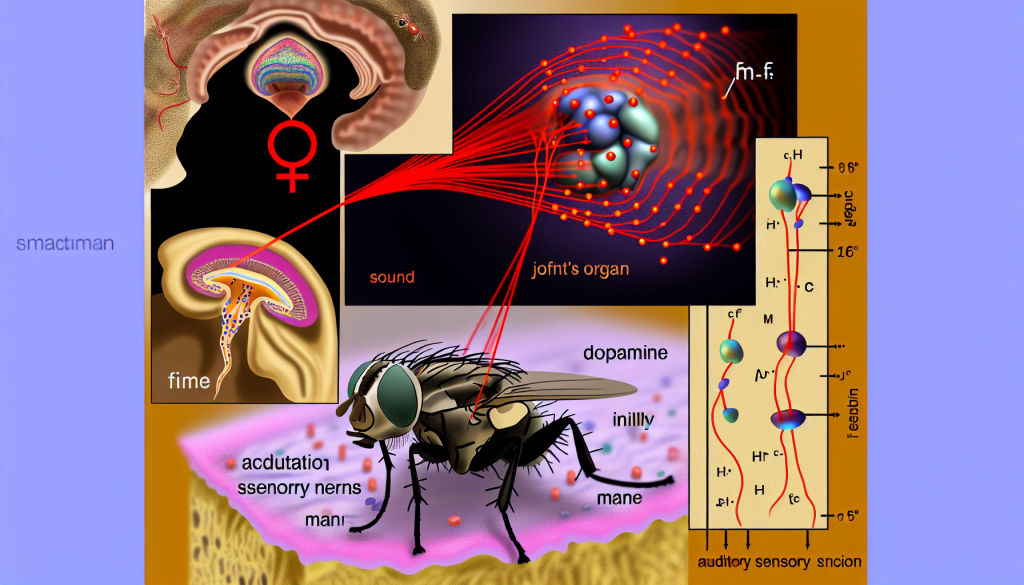Dopamine helps mating-driven female flies become more attuned to sound

Image:
Dopamine signals boost the activity of auditory sensory neurons in Johnston's organs within unmated female fruit flies, heightening their ability to detect sounds—especially the mating songs of males.
Credit: Issey Takahashi
Many animal species, humans included, can adapt their hearing sensitivity depending on context. This flexibility helps them allocate attention to the most significant sounds, especially when brain resources are limited. Supporting this concept, a group of scientists at Nagoya University in Japan discovered that female fruit flies respond more to sound—particularly courtship songs—when they are ready to mate, with dopamine playing a key role in this change in sensitivity.
"This research marks an important beginning in unveiling how animal brains adjust auditory responses based on context," said lead researcher Azusa Kamikouchi, a professor at Nagoya University's Graduate School of Science and the Institute of Transformative Bio-Molecules. The study appears in the journal iScience. It has long been known that mating status can shape how animals respond to mating calls, but the underlying brain mechanisms have remained largely unknown. Professor Kamikouchi, doctoral student Haruna Yamakoshi, and colleagues conducted experiments on the common fruit fly, Drosophila melanogaster, a convenient model system in neuroscience due to its simple neural structure, genetic tools, and rapid breeding cycle.
Male Drosophila communicate their mating interest using wing vibrations that create distinct courtship sounds. Females in turn use these sounds to decide whether to mate. Virgin females are more open to mating, while previously mated ones are less receptive. Based on this, researchers questioned whether female flies' receptivity to male sounds could shift depending on their mating history.
To test this idea, the researchers zeroed in on the auditory structures known as Johnston’s organs—located in the second segment of the antenna. Using a high-resolution RNA-sequencing database, they studied which neurotransmitter receptors these auditory neurons express. They discovered that three kinds of dopamine receptors were highly present in these neurons.
Next, they examined whether dopamine actually alters these neurons' sensitivity to sound. They achieved this by reducing dopamine receptor expression in virgin female flies and monitoring their neural activity responses to courtship sounds via a method called calcium imaging. The results revealed a weakened response to sound in unmated females with blocked dopamine receptors. However, the same reduction was not seen in females that had mated or those recently emerged from pupae, both of which exhibit lower mating motivation.
To link this neural change to actual behavior, the researchers observed how these females reacted to courtship songs. By timing how long it took them to begin mating, they found that flies with disrupted dopamine signaling were slower to respond to male songs, suggesting that the combination of dopamine and sound typically enhances mating behavior.
"Our findings suggest that dopamine contributes to flexible hearing responses," said Kamikouchi. "This aligns with other research showing that an animal's hearing abilities can vary with their situation—a trait seen in humans, rodents, and frogs. Our work points to a shared biological mechanism across species for this form of auditory adjustment."
These discoveries offer a deeper look into how animals tailor their sound processing in response to behavioral needs and internal states.
Publication: This research, titled "Mating status-dependent dopaminergic modulation of auditory sensory neurons in Drosophila," appeared in iScience on July 29, 2025.
Funding: The study received support from several Japanese science programs and grants, including MEXT KAKENHI Grants-in-Aid for Scientific Research, Transformative Research Areas such as “iPlasticity,” and initiatives within Nagoya University like the Graduate Program of Transformative Chem-Bio Research. Contributions were also made by JST FOREST and the Japan Society for the Promotion of Science.
Journal
iScience
DOI
10.1016/j.isci.2025.113232
Method of Research
Experimental study
Subject of Research
Animals
Article Title
Mating status-dependent dopaminergic modulation of auditory sensory neurons in Drosophila
Article Publication Date
29-Jul-2025

